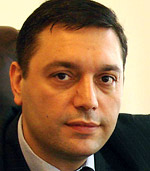– Mr. Arustamyan, what programs are currently being implemented with the support of the European community in the judicial-legal sphere of Armenia?
– Currently with the support of the EU the program on Budgetary Support is being implemented aimed at improving the program on supporting the reforms of the justice sector. The financial support is directly included in the state budget, from which the funds are directed to the reform of this sector. In this regard, the program on strategic reforms of judicial-legal sector 2009-2011 is already confirmed and the rest of the activities of the program are directed by the decrees of the RA President.
– What is the program directed to?
– It is directed to improving the justice sector. The program is aimed at reducing corruption risks, increasing the reforms of justice, etc. The measures of the program, relate to the judicial branch, the prosecutor’s office, attorneys’ institution and other sectors. Currently the second program on Access to Justice is also pending, which is a joint program financed by the EU and partly by the Council of Europe. But it’s implemented by the CoE. The program has three main components – judiciary school and further development of attorneys’ schools, which also implies elaboration of judicial acts and support to expertise.
– How much money was allotted to these two programs?
– For the first program on budgetary support 16 million Euros were allotted for three years. It is planned that the 16 million should be divided per year – 8-4-4 respectively. The state, by handling certain obligations, receives further financing after the successful implementation of the previous portion of the program. The first pre-condition is that there should be a program, an action plan and a council of management. It means the main matter is the assignment of the president, which includes an action plan. This means that we have basically satisfied the first pre-condition of the program. So we expect the first portion of financing. As of the next trenches then the concrete actions will become a basis for the implementation of the program. The European experts assess to what percentage we have abided with their requirements and only after that they define the expediency of financing. The total budget of the second program is 3.9 million Euros.
– During the last years the criminal institutions have always been in the center of attention. Can we say that the conditions of the penitentiaries conform to international standards?
– No. Back in March 2001 the government approved the charter of reforms of penitentiaries, which emphasizes to which directions most of the attention should be drawn to – legal reforms, conduct of infrastructure and social-psychological activities, reforms of health conditions of staffers and inmates of penitentiaries, issues of employment of inmates, rectifications of financial policies. We have almost done all the obligations of ours in this direction and we should be fully done by the middle of the next year. A few questions are only unresolved, which require financial investments. We also have issues with infrastructure reforms. Our current premises are not sufficient for the conduct of reforms and complete solution of issues. It means that we have legal regulations but those very often fail to be fully accomplished due to the lack of necessary infrastructures.
– Are you anticipating new programs with European structures?
– Of course. Currently we are communicating with our European counterparts in these directions in order to differentiate in what directions we should be working in after the completion of the program for period of 2009-2011. We need to define what solutions we see. For example, for the same program for penitentiaries we are envisaging our steps for the upcoming 10-15 years. This is defined in the charter presented to the government as well.

